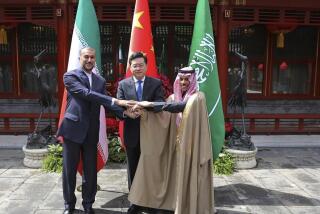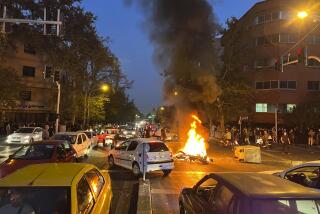LONDON AND TEHRAN: A ROCKY ROAD
- Share via
Except for a brief thaw late last year, British-Iranian relations have been troubled for the past 8 1/2 years. Here is a brief summary:
September, 1980: With Iran’s relations with the West in turmoil over seizure of U.S. Embassy, Britain closes its embassy in Tehran. Four diplomats stay to run British interests section in Swedish Embassy.
November, 1985: British businessman Roger Cooper arrested in Iran and accused of spying, but is not charged or tried.
May, 1987: British police arrest Iranian diplomat in Manchester on shoplifting charges. In Tehran, British diplomat is abducted and beaten up, apparently in retaliation.
June, 1987: After series of tit-for-tat diplomatic expulsions triggered by Manchester incident, London recalls its now 19-member diplomatic staff from Tehran and reduces Iranian diplomatic presence in London to a lone charge d’affaires.
September, 1987: Iran attacks British tanker in Persian Gulf. Britain orders Iran’s arms-purchasing office in London closed.
June, 1988: Iran and Britain hold talks in London on compensation for damage done to each other’s embassies in political violence in 1979 and 1980. Success leads to broader talks, and agreement is reached to resume full diplomatic ties.
December, 1988: British Embassy in Tehran reopens. Nicholas Nicola, British tourist held in Iran for more than two years, is freed and comes home. Hopes rise for release of Cooper.
February, 1989: Ayatollah Ruhollah Khomeini passes death sentence on British novelist Salman Rushdie. Cooper is given “heavy” but unspecified sentence. Britain joins European Community partners in withdrawing their heads of mission from Tehran. Britain also withdraws its diplomats from newly reopened Tehran embassy and expels Iran’s two diplomats in London.
Feb. 28: Iran votes to sever diplomatic ties with Britain.
More to Read
Sign up for Essential California
The most important California stories and recommendations in your inbox every morning.
You may occasionally receive promotional content from the Los Angeles Times.










